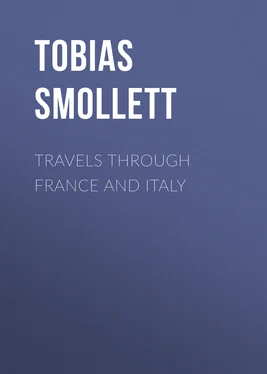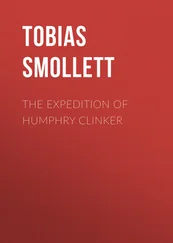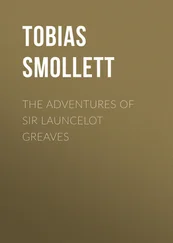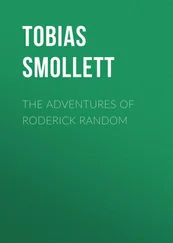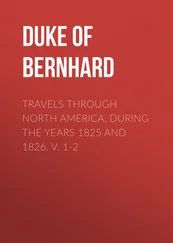Tobias Smollett - Travels through France and Italy
Здесь есть возможность читать онлайн «Tobias Smollett - Travels through France and Italy» — ознакомительный отрывок электронной книги совершенно бесплатно, а после прочтения отрывка купить полную версию. В некоторых случаях можно слушать аудио, скачать через торрент в формате fb2 и присутствует краткое содержание. Жанр: Путешествия и география, История, foreign_edu, foreign_antique, foreign_prose, на английском языке. Описание произведения, (предисловие) а так же отзывы посетителей доступны на портале библиотеки ЛибКат.
- Название:Travels through France and Italy
- Автор:
- Жанр:
- Год:неизвестен
- ISBN:нет данных
- Рейтинг книги:5 / 5. Голосов: 1
-
Избранное:Добавить в избранное
- Отзывы:
-
Ваша оценка:
- 100
- 1
- 2
- 3
- 4
- 5
Travels through France and Italy: краткое содержание, описание и аннотация
Предлагаем к чтению аннотацию, описание, краткое содержание или предисловие (зависит от того, что написал сам автор книги «Travels through France and Italy»). Если вы не нашли необходимую информацию о книге — напишите в комментариях, мы постараемся отыскать её.
Travels through France and Italy — читать онлайн ознакомительный отрывок
Ниже представлен текст книги, разбитый по страницам. Система сохранения места последней прочитанной страницы, позволяет с удобством читать онлайн бесплатно книгу «Travels through France and Italy», без необходимости каждый раз заново искать на чём Вы остановились. Поставьте закладку, и сможете в любой момент перейти на страницу, на которой закончили чтение.
Интервал:
Закладка:
"If a Frenchman is admitted into your family, and distinguished by repeated marks of your friendship and regard, the first return he makes for your civilities is to make love to your wife, if she is handsome; if not, to your sister, or daughter, or niece. If he suffers a repulse from your wife, or attempts in vain to debauch your sister, or your daughter, or your niece, he will, rather than not play the traitor with his gallantry, make his addresses to your grandmother; and ten to one but in one shape or another he will find means to ruin the peace of a family in which he has been so kindly entertained. What he cannot accomplish by dint of compliment and personal attendance, he will endeavour to effect by reinforcing these with billets-doux, songs, and verses, of which he always makes a provision for such purposes. If he is detected in these efforts of treachery, and reproached with his ingratitude, he impudently declares that what he had done was no more than simple gallantry, considered in France as an indispensable duty on every man who pretended to good breeding. Nay, he will even affirm that his endeavours to corrupt your wife, or deflower your daughter, were the most genuine proofs he could give of his particular regard for your family.
"If there were five hundred dishes at table, a Frenchman will eat of all of them, and then complain he has no appetite—this I have several times remarked. A friend of mine gained a considerable wager upon an experiment of this kind; the petit-maitre ate of fourteen different plates, besides the dessert, then disparaged the cook, declaring he was no better than a marmiton, or turnspit."
The gross unfairness, no less than the consummate cleverness, of this caricature compels us to remember that this was written in the most insular period of our manners, and during a brief lull in a century of almost incessant mutual hostility between the two nations. Aristocrats like Walpole, Gibbon, and Chesterfield could regard France from a cosmopolitan point of view, as leading the comite of nations. But to sturdy and true-born patriots, such as Hogarth and Smollett, reciprocal politeness appeared as grotesque as an exchange of amenities would be between a cormorant and an ape. Consequently, it was no doubt with a sense of positive relief to his feelings that Smollett could bring himself to sum up the whole matter thus. "A Frenchman lays out his whole revenue upon taudry suits of cloaths, or in furnishing a magnificent repas of fifty or a hundred dishes, one-half of which are not eatable or intended to be eaten. His wardrobe goes to the fripier, his dishes to the dogs, and himself to the devil."
These trenchant passages were written partly, it may be imagined, to suit the English taste of the day. In that object they must have succeeded, for they were frequently transcribed into contemporary periodicals. In extenuation of Smollett's honesty of purpose, however, it may be urged that he was always a thoroughgoing patriot, [Witness his violently anti-French play, the Reprisal of 1757.] and that, coming from a Calvinistic country where a measure of Tartufism was a necessary condition of respectability, he reproduces the common English error of ignoring how apt a Frenchman is to conceal a number of his best qualities. Two other considerations deserve attention. The race-portrait was in Smollett's day at the very height of its disreputable reign. Secondly, we must remember how very profoundly French character has been modified since 1763, and more especially in consequence of the cataclysms of 1789 and 1870.
Smollett's vis comica is conspicuous in the account of the coiffure of the period and of the superstitious reverence which a Frenchman of that day paid to his hair. In tracing the origin of this superstition he exhibits casually his historical learning. The crine profuso and barba demissa of the reges crinitos, as the Merovingians were called, are often referred to by ancient chroniclers. Long hair was identified with right of succession, as a mark of royal race, and the maintenance of ancient tradition. A tondu signified a slave, and even under the Carolingians to shave a prince meant to affirm his exclusion from the succession.
V
A general improvement in English roads, roadside inns, and methods of conveyance commenced about 1715. The continental roads lagged behind, until when Arthur Young wrote in 1788-89 they had got badly into arrears. The pace of locomotion between Rome and England changed very little in effect from the days of Julius Caesar to those of George III. It has been said with point that Trajan and Sir Robert Peel, travelling both at their utmost speed achieved the distance between Rome and London in an almost precisely similar space of time. Smollett decided to travel post between Paris and Lyons, and he found that the journey lasted full five days and cost upwards of thirty guineas. [One of the earliest printed road books in existence gives the posts between Paris and Lyons. This tiny duodecimo, dated 1500, and more than worth its weight in gold has just been acquired by the British Museum. On the old Roman routes, see Arnold's Lectures on Modern History, 1842.] Of roads there was a choice between two. The shorter route by Nevers and Moulins amounted to just about three hundred English miles. The longer route by Auxerre and Dijon, which Smollett preferred extended to three hundred and thirty miles. The two roads diverged after passing Fontainebleau, the shorter by Nemours and the longer by Moret. The first road was the smoother, but apart from the chance of seeing the Vendange the route de Burgoyne was far the more picturesque. Smollett's portraiture of the peasantry in the less cultivated regions prepares the mind for Young's famous description of those "gaunt emblems of famine." In Burgundy the Doctor says, "I saw a peasant ploughing the ground with a jackass, a lean cow, and a he-goat yoked together." His vignette of the fantastic petit-maitre at Sens, and his own abominable rudeness, is worthy of the master hand that drew the poor debtor Jackson in the Marshalsea in Roderick Random.
His frank avowal of ill temper at the time deprives our entertainment of the unamiable tinge of which it would otherwise have partaken. "The truth is, I was that day more than usually peevish, from the bad weather as well as from the dread of a fit of asthma, with which I was threatened. And I daresay my appearance seemed as uncouth to him as his travelling dress appeared to me. I had a grey, mourning frock under a wide greatcoat, a bob-wig without powder, a very large laced hat, and a meagre, wrinkled, discontented countenance."
From Lyons the traveller secured a return berline going back to Avignon with three mules and a voiturier named Joseph. Joseph, though he turned out to be an ex-criminal, proved himself the one Frenchman upon whose fidelity and good service Smollett could look back with unfeigned satisfaction. The sight of a skeleton dangling from a gibbet near Valence surprised from this droll knave an ejaculation and a story, from which it appeared only too evident that he had been first the comrade and then the executioner of one of the most notorious brigands of the century. The story as told by Smollett does not wholly agree with the best authenticated particulars. The Dick Turpin of eighteenth century France, Mandrin has engendered almost as many fables as his English congener. [See Maignien's Bibliographie des Ecrits relatifs a Mandrin.] As far as I have been able to discover, the great freebooter was born at St. Etienne in May 1724. His father having been killed in a coining affair, Mandrin swore to revenge him. He deserted from the army accordingly, and got together a gang of contrebandiers, at the head of which his career in Savoy and Dauphine almost resembles that of one of the famous guerilla chieftains described in Hardman's Peninsular Scenes and Sketches. Captured eventually, owing to the treachery of a comrade, he was put to death on the wheel at Valence on 26th May 1755. Five comrades were thrown into jail with him; and one of these obtained his pardon on condition of acting as Mandrin's executioner. Alas, poor Joseph!
Читать дальшеИнтервал:
Закладка:
Похожие книги на «Travels through France and Italy»
Представляем Вашему вниманию похожие книги на «Travels through France and Italy» списком для выбора. Мы отобрали схожую по названию и смыслу литературу в надежде предоставить читателям больше вариантов отыскать новые, интересные, ещё непрочитанные произведения.
Обсуждение, отзывы о книге «Travels through France and Italy» и просто собственные мнения читателей. Оставьте ваши комментарии, напишите, что Вы думаете о произведении, его смысле или главных героях. Укажите что конкретно понравилось, а что нет, и почему Вы так считаете.
